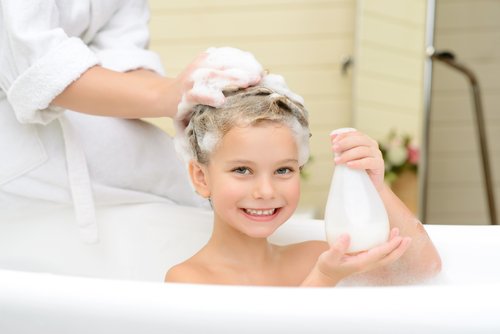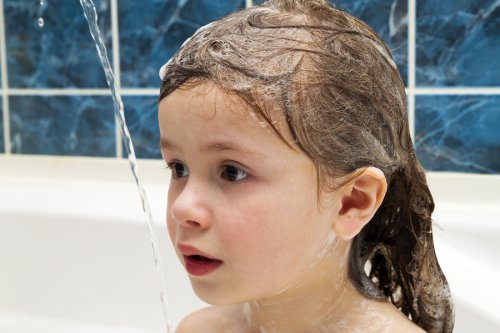The Importance of Bath Time: Practical Tips

Bath time can be just the right moment to strengthen bonds with our children and stimulate their autonomy. Take advantage of this time and make it into a fun and pleasant moment.
To do so, you need to know when’s the best time to bathe your little ones and how long bath time should last. Here you’ll find helpful advice for bathing your children.
The importance of bath time for children
To maintain children’s good health, it’s important to develop good personal hygiene habits from a young age. This helps immensely when it comes to preventing a variety of illnesses. That’s what makes bath time so important.
Bathing is a hygiene measure that is vitally important in getting rid of germs and bacterias. At the same time, it’s also a good way to contribute to children’s sense of autonomy.
Once babies reach 6 months of age, bath time becomes an opportunity for fun and play. From as little as one year old, babies can start to participate in their own personal hygiene. At age three, they can start to gain even more independence.
Tips for bathing children
Many children don’t like to be alone in the bathtub, especially if they’re under 3 years old. For that reason, it’s good to ask them if they want the company of a toy or doll in order to convince them to take a bath.
You can let your children use a sponge on their own. At this age, they’re more conscious of their bodies and often want to wash themselves. Another valuable piece of advice is to use neutral shampoo, and in small amounts.
You’ll find more tips below to help you make the most of bath time:
Choosing the right time
While setting an exact hour for bath time isn’t a necessity, you can use other activities as references to help establish a routine – for example, after dinner and before bed.
This way, your child will know when it’s time to take a bath. It’s important to point these routines out to your children. It helps them build their identity and provides stability during this stage of constant growth and discovery of new things.

Knowing which areas to wash, and which not to wash
By age three, parents can let children wash their own belly, arms and legs, using their own sponge. However, you should still be responsible for washing more delicate areas.
For example: Ears. You should never introduce anything into a child’s ear, and you should always be sure to rinse well.
The same is true for the nose. You can wash using a sponge and saline solution.
Dangers when it comes to bath time
It’s common for accidents to occur during bath time if you fail to put proper measures into place. To prevent accidents, you need to take certain precautions.
First of all, when your child stands up in the bathtub, you should always hold his or her hand to prevent slips. If possible, put a slip-proof rug or stickers on the bottom of the bath tub for even more safety.
At the same time, keep all electrical appliances away from the bathtub and don’t leave your child alone in the water at any time.
Even the smallest distraction can end in a serious accident. Be sure to take everything you need with you to the bathroom before you even get started.
“From as little as one year old, babies can start to participate in their own personal hygiene. By age three, they can start to gain even more independence.”
Games and experiments
If your child already goes to school, take advantage of this time to ask how things are going or ask about his or her friends. This way, you strengthen bonds and encourage confidence and security.
This moment also sets the perfect stage for teaching new things, games, and experiments. For example, to favor motor skills, teach your child to put water from a bottle into a cup without spilling. Or, have your child learn the names of new body parts.
Adjust water temperature
To avoid burns, you should adjust water temperature and make sure that it’s under 98.6 degrees.
To test water temperature, put your elbow or the underside of your wrist into the water. Make sure the water feels warm, but not hot.
How long should bath time last?
It’s up to you how much time you want to dedicate to bath time. However, the main objective should be your child’s hygiene, and not spending a specific amount of time in the water.
Children are prone to getting colds. So make sure bath time doesn’t go too long.

When are children old enough to bathe alone?
By the time children are 6 years old, most can bathe themselves, meaning you can give them their privacy. However, you should still practice a certain amount of control. For example, tell your child how long he or she can stay in the water, and make sure he or she washes properly.
Bath time shouldn’t be a boring or unpleasant activity for children. Rather, the routine should allow children to gradually take on the responsibility of caring for their own personal hygiene.
Be creative and take on this task with contagious enthusiasm!
All cited sources were thoroughly reviewed by our team to ensure their quality, reliability, currency, and validity. The bibliography of this article was considered reliable and of academic or scientific accuracy.
- AEPED. (n.d.). Baño en los niños. Asociación Española de Pediatría. https://enfamilia.aeped.es/vida-sana/bano-en-ninos
- Health Children staff. (n.d.). La edad correcta para recibir entrenamiento para el baño. Healthy Children. https://www.healthychildren.org/Spanish/ages-stages/toddler/toilet-training/Paginas/The-Right-Age-to-Toilet-Train.aspx
This text is provided for informational purposes only and does not replace consultation with a professional. If in doubt, consult your specialist.
